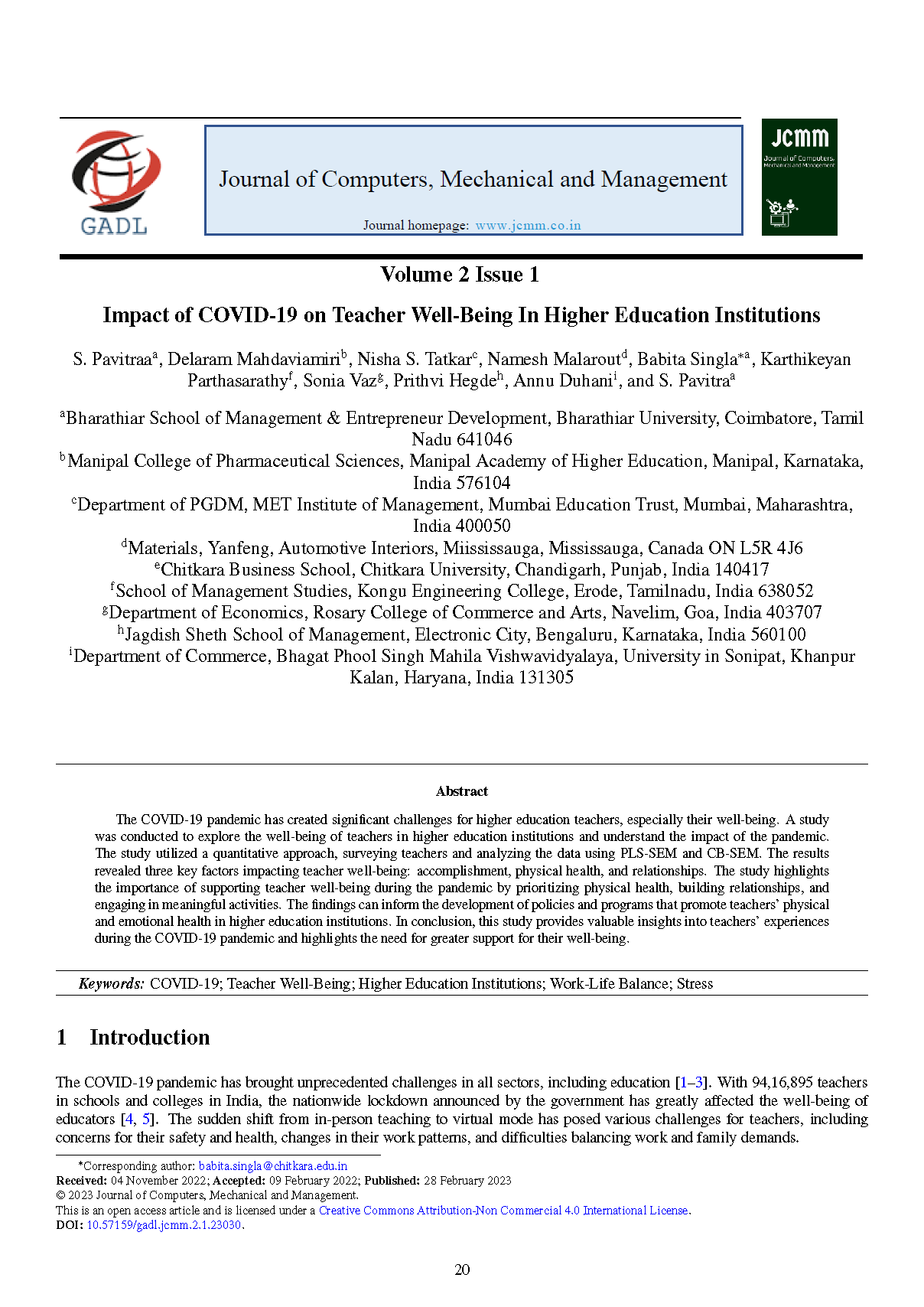Impact of COVID-19 on Teacher Well-Being in Higher Education Institutions
DOI:
https://doi.org/10.57159/gadl.jcmm.2.1.23030Keywords:
COVID-19, Teacher well-being, Higher education institutions, Work-life balance, StressAbstract
The COVID-19 pandemic has created significant challenges for higher education teachers, especially their well-being. A study was conducted to investigate the well-being of teachers in higher education institutions and to comprehend the pandemic's impact. The study took a quantitative approach, surveying and interviewing the teachers and analyzing the data with PLS-SEM and CB-SEM. The results revealed three key factors impacting teacher well-being: accomplishment, physical health, and relationships. The study emphasizes the importance of supporting teacher well-being during the pandemic by prioritizing physical health, building relationships, and engaging in meaningful activities. The findings can help to shape policies and programs that promote physical and emotional health in higher education institutions. Finally, this study provides valuable insights into teachers' experiences during the COVID-19 pandemic and emphasizes the need for increased support for their well-being.
References
A. Haleem, M. Javaid, and R. Vaishya, Effects of COVID-19 pandemic in daily life, "Current Medicine Research and Practice," 10, (2), pp. 78--79, 2020.
I. Chakraborty and P. Maity, COVID-19 outbreak: migration, effects on society, global environment and prevention, "Science of The Total Environment," 728, p. 138882, 2020.
H. Wang et al., Phase-adjusted estimation of the number of Coronavirus Disease 2019 cases in Wuhan, China, "Cell Discovery," 6, (1), p. 10, 2020.
R. Bhat, V. Singh, N. Naik, C. Kamath, P. Mulimani, and N. Kulkarni, COVID 2019 outbreak: The disappointment in Indian teachers, "Asian Journal of Psychiatry," 50, p. 102047, 2020.
A. Mathur, A. Basra, and Y. Singh, Unembellished digital education: a paradigm shift for education in India, in Proceedings of the International Conference on Best Innovative Teaching Strategies (ICON-BITS 2021), 2022.
A. Graham and J. Truscott, Meditation in the classroom: supporting both student and teacher well-being?, "Education 3-13," 48, (7), pp. 807--819, 2020.
H. Song, Q. Gu, and Z. Zhang, An exploratory study of teachers' subjective well-being: understanding the links between teachers' income satisfaction, altruism, self-efficacy and work satisfaction, "Teachers and Teaching," 26, (1), pp. 3--31, 2020.
J. Bishop, Increasing participation in online communities: A framework for human--computer interaction, "Computers in Human Behavior," 23, (4), pp. 1881--1893, 2007.
R. Collie and A. Martin, Teacher well-being during covid-19, Teacher: Evidence, Insight, Action, Apr. 2020.
D. Roorda, H. Koomen, J. Spilt, and F. Oort, The influence of affective teacher--student relationships on students' school engagement and achievement, "Review of Educational Research," 81, (4), pp. 493--529, 2011.
Tameka Porter, reflecting on teacher well-being during the COVID-19 pandemic, Regional Educational Laboratory, pp. 28--31, 2020.
M. Beiser, Components and correlates of mental well-being, "Journal of Health and Social Behavior," 15, (4), p. 320, 1974.
B. See, L. Wardle, and P. Collie, Teachers' well-being and workload during Covid-19 lockdown, Durham, 2020.
K. O'Connor, "You choose to care": Teachers, emotions and professional identity, "Teaching and Teacher Education," 24, (1), pp. 117--126, 2008.
A. Hargreaves, The emotional practice of teaching, "Teaching and Teacher Education," 14, (8), pp. 835--854, 1998.
S. Owen, Professional learning communities: building skills, reinvigorating the passion, and nurturing teacher well-being and "flourishing" within significantly innovative schooling contexts, "Educational Review," 68, (4), pp. 403--419, 2016.
C. Millet, S. Johnson, C. Cooper, I. Donald, S. Cartwright, and P. Taylor, Britain's most stressful occupations and the role of emotional labour, in BPS Occupational Psychology Conference, 2005.
M. Smith and S. Bourke, Teacher stress: examining a model based on context, workload, and satisfaction, "Teaching and Teacher Education," 8, (1), pp. 31--46, 1992.
C. Kokkinos, G. Panayiotou, and A. Davazoglou, Correlates of teacher appraisals of student behaviors, "Psychology in the Schools," 42, (1), pp. 79--89, 2005.
E. Greenglass, R. Burke, and R. Konarski, The impact of social support on the development of burnout in teachers: Examination of a model, "Work & Stress," 11, (3), pp. 267--278, 1997.
R. Burke and E. Greenglass, A longitudinal study of psychological burnout in teachers, "Human Relations," 48, (2), pp. 187--202, 1995.
M. Borg, R. Riding, and J. Falzon, Stress in teaching: a study of occupational stress and its determinants, job satisfaction and career commitment among primary schoolteachers, "Educational Psychology," 11, (1), pp. 59--75, 1991.
E. Smith, L. Holmes, and F. Burkle, Exploring the physical and mental health challenges associated with emergency service call-taking and dispatching: a review of the literature, "Prehospital and Disaster Medicine," 34, (6), pp. 619--624, 2019.

Downloads
Published
How to Cite
Issue
Section
License
Copyright (c) 2023 Journal of Computers, Mechanical and Management

This work is licensed under a Creative Commons Attribution-NonCommercial 4.0 International License.
The Journal of Computers, Mechanical and Management applies the CC Attribution- Non-Commercial 4.0 International License to its published articles. While retaining copyright ownership of the content, the journal permits activities such as downloading, reusing, reprinting, modifying, distributing, and copying of the articles, as long as the original authors and source are appropriately cited. Proper attribution is ensured by citing the original publication.





